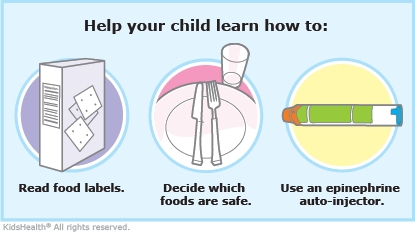A food challenge is a test that's used to find out if someone is allergic to a certain food or has outgrown an allergy.
Your child had an allergic reaction after eating the food, so the test was stopped. The health care provider treated your child's allergic reaction and watched them for several hours to make sure the reaction was under control.
You can now care for your child at home. Watch them carefully for the rest of the day since sometimes a late reaction can happen.



Your child has one of these signs of a mild allergic reaction:
If your child has more than one of these mild signs, or a mild sign is getting worse, call 911 and give the epinephrine (see below).

Your child has any signs of a severe allergic reaction, such as:
Follow these steps:

Why are food challenge tests done? A food challenge test can help doctors find out:
Where can I get more information about managing food allergies? You can learn more online at the Food Allergy Research and Education (FARE) website: foodallergy.org.